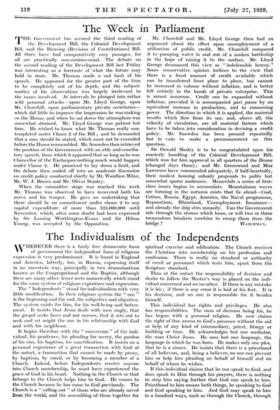The Week in Parliament
IRE Government has secured the third reading of the _Development Bill, the Colonial Development Bill, and the Housing (Revision of Contributions) Bill.
All three have had comparatively easy passages, for all are practically non-controversial. The debate on the second reading of the Development Bill last Friday was interesting as a foretaste of what the future may hold in store. Mr. Thomas made a sad hash of his speech. He appeared for the greater part of the time to be completely out of his depth, and the subject- matter of his observations was largely irrelevant to the issues involved. At intervals he plunged into rather wild personal attacks—upon Mr. Lloyd George, upon Mr. Churchill, upon parliamentary private secretaries— which did little to improve the impression he was making on the House, and when he sat down the atmosphere was somewhat strained. Mr. Lloyd George was patient but firm. He wished to know what Mr. Thomas really con- templated under Clause 2 of the Bill ; and he demanded that a sum should be stated, which must not be exceeded before the House reassembled. Mr. Snowden then retrieved the position of the Government with an able and concilia- tory speech, from which it appeared that so long as he was Chancellor of the Exchequer nothing much would happen under Clause 2. He promised to lay down a limit, and the debate then cooled off into an academic discussion on credit policy conducted chiefly by Mr. Wardlaw-Milne, Mr. W. J. Brown and Mr. Oliver Stanley.
When the committee stage was reached this week Mr. Thomas was observed to have recovered both his nerve and his temper. He gave an undertaking that there should be no commitment under clause 2 to any capital expenditure of more than £25,000,000 until November, which, after some doubt had been expressed by Sir Laming Worthington-Evans and Sir Hilton Young, was accc pted by the Opposition. Mr. Churchill and Mr. Lloyd George .then had an argument about the effect upon unemployment of .a utilization of public credit. Mr. Churchill compared it to pumping water in and out of a sunken battleship in the hope of raising it to the surface. Mr. Lloyd George denounced this view as " indefensible heresy." Some conservative opinion inclines to the view that there is a fixed amount of credit available which can be transferred from place to place, but cannot be increased in volume without inflation, and is better left .entirely in the hands of • private enterprise. This is arrant nonsense. Credit can be expanded without inflation, provided it is accompanied pari passu, by an equivalent increase in production, and in consuming power. The direction in which it is applied, the material results which flow from its use, and, above all, the velocity of circulation, are all material factors which have to be taken into consideration in devising a credit policy. Mr. Snowden has been pressed repeatedly but in vain to make a pronouncement on this question.
Sir Oswald Mosley is to be congratulated upon his masterly handling of the Colonial Development Bill, which won for him approval in all quarters of the House (changed days these) ; and Mr. Greenwood and Miss Lawrence have commended adequately, if half-heartedly, their modest housing subsidy proposals to polite but somewhat sparse audiences. Meanwhile a series of first- class issues begins to accumulate. Mountainous waves are forming in the autumn mists that lie ahead—Coal, Cotton, Russia, Egypt, America, the Naval programme, Reparations, Rhineland, Unemployment Insurance— and already the ship stirs uneasily. Can the Government ride through the storms which loom, or will two or three tremendous breakers combine to sweep them from the


































 Previous page
Previous page